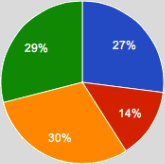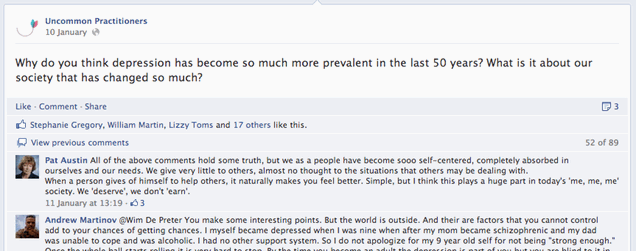
There's little consensus about what's causing the rise in rates of depression
So we asked our Uncommon Practitioners this question on our Facebook page:
‘Why do you think depression has become so much more prevalent in the last 50 years? What is it about our society that has changed so much?’
We were so impressed at the energy and insight of the responses (88 at the time of writing) that we decided to summarize them here.
Rather than one answer being the ‘right one’ or the only one, I see your informed replies as vital parts of a whole ‘mosaic’ of possible depression causes.
Prefer to watch instead?
Disconnected Communities
Twenty-seven percent of the practitioners blamed disconnected communities – and we know that the need for the connection to community is certainly an important human primal need.
It was suggested by you that people used to live in closer communities, be closer to nature or belong to a faith. Certainly feeling connected to something greater than oneself is protective of mental and even physical health. And in ‘primitive’ cultures that still retain a strong sense of connection and community, depression cases are practically unknown.
Materialism
Quite a lot of people talked about the pressure to ‘keep up’ in a world which increasingly encourages materialism. They talked about how we live in a ‘me me me’ society which is why people feel isolated or disconnected from others.
And some doubted whether depression had really increased over the last fifty years – they said perhaps there was just an increased reporting in cases and that public acceptance made it more ok to seek help.
Sadly, depression rates have gone up 1000% since the end of World War Two (1). While the research into the increase in depression does take into account both the increase in acceptance of the illness and the number of diagnoses, it also looks at the increased suicide and attempted suicide rate in our modern society. These statistics are so high it really does seem that depression genuinely has and is still increasing. And, as I’ve said, this is particularly obvious when you look at depression and suicide rates in traditional societies today, compared to our industrialized one. Depression is practically nonexistent in traditional societies, but skyrocketing in ours.
Unrealistic Expectations
Clare Waters commented that today’s society makes people miserable because there’s “pressure to have the perfect skinny body and a fat bank account.” A nice summing up, I thought, of skewed expectations of what really leads to well being. Others also mentioned the huge media pressure to be “perfect”.
Fourteen percent mentioned “the media” – meaning 24/7 news saturation, and constant stories of suffering. And it was also mentioned that because of technological changes there was ‘pressure to be connected.’
I think there’s a lot in this.
Depression rides off the back of fearful and pessimistic expectations, expectations which can be engineered through simplistic, materialistic messages from the media and others around you who have also been heavily influenced by our ‘skinny body/fat bank account, consume to be happy’ culture.
Talking of consuming, mention was also made of how antidepressant products are very freely available but don’t work very often – this is something I will address in my video series.
Diet
30% of commenters suggested changes in diet over the last fifty years – particularly that mass consumption of processed nutritionally defunct foods is fueling depression.
Oh and I loved this one – Lara Eardley urged us to have more sex. Certainly we all share the need for both intimacy and healthy pleasures. Although to be fair Lara also said much more than this, that the best things in life are free, that we should admire the beauty in nature such as a starry night, and stop and relax and enjoy the moment. I think we could all reclaim our appreciation of the beauty of the world. Certainly I’ve noticed that as clients start to leave depression behind they do begin to connect with the healthy pleasures, and the beauty of the world.
I see depression as being caused in part by all these things and more. Partly caused by the environment and partly caused by individual psychology, trained and shaped by experience. ‘Happiness is found within’ may be true but the inside is nurtured by the outside and environment matters – even a plant needs water and sunlight to help fulfil its potential.
Learn more about what causes depression and how to treat it with our course How to Lift Depression Fast. Read more about it here.
Notes:
1) David O. Antonuccio and William G. Danton, University of Nevada School of Medicine and Reno Veterans Affairs Medical Center Garland Y. DeNelsky, Cleveland Clinic Foundation: “Psychotherapy the best medicine”, and their meta-analysis of over 100,000 pieces of research into the causes, consequences, and best treatments for clinical depression, conducted 1978-1993.











